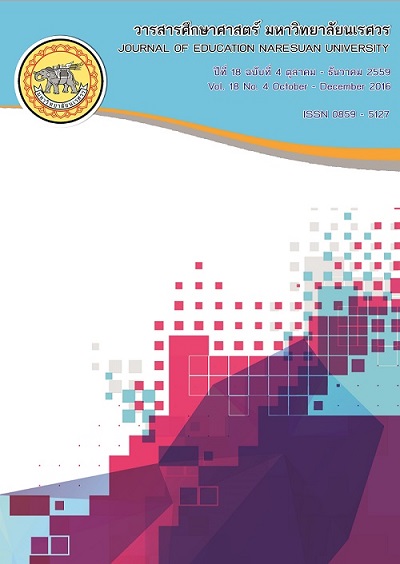การศึกษาเปรียบเทียบการพัฒนาทักษะภาษาอังกฤษโดยโรงเรียนเอกชนในประเทศอินเดียและประเทศไทยที่ใช้หลักสูตรภาษาอังกฤษ
Main Article Content
Abstract
การวิจัยในครั้งนี้มีวัตถุประสงค์เพื่อศึกษาเปรียบเทียบการพัฒนาทักษะภาษาอังกฤษโดยโรงเรียนเอกชนในประเทศอินเดียและประเทศไทยที่ใช้หลักสูตรภาษาอังกฤษและเพื่อนำเสนอแนวทางการพัฒนาทักษะภาษาอังกฤษในโรงเรียนเอกชนของประเทศไทย วัตถุประสงค์เฉพาะ คือ เพื่อศึกษาบริบททางสังคมและวัฒนธรรมและนโยบายการสอนภาษาอังกฤษและระบบการศึกษาในปัจจุบันของประเทศอินเดีย ศึกษาสภาพการจัดการเรียนการสอนโดยหลักสูตรภาษาอังกฤษในโรงเรียนเอกชนของประเทศอินเดียที่ประสบความสำเร็จ ศึกษาบริบททางสังคมและวัฒนธรรมและนโยบายการสอนภาษาอังกฤษ ระบบการศึกษา หลักสูตรและการจัดการเรียนการสอนในโรงเรียนเอกชนที่ใช้หลักสูตรภาษาอังกฤษในประเทศไทย และเปรียบเทียบสภาพการพัฒนาภาษาอังกฤษของโรงเรียนเอกชนที่ใช้หลักสูตรภาษาอังกฤษในสองระบบนี้ แล้วนำเสนอแนวทางการประยุกต์ใช้บทเรียนจากประเทศอินเดีย ระเบียบวิธีวิจัย เป็นการวิจัยเชิงคุณภาพ ประกอบด้วย การเปรียบเทียบระบบการศึกษาและการอิงผู้เชี่ยวชาญ โดยในขั้นตอนที่ 1, 2 และ 3 ศึกษาบริบท นโยบาย และสภาพการจัดการเรียนการสอนภาษาอังกฤษในโรงเรียนเอกชนในประเทศอินเดียและประเทศไทย ใช้ข้อมูลจากเอกสาร การสังเกต และสัมภาษณ์ผู้บริหารโรงเรียนเอกชน 6 โรง ในเขต ดาจีลิ่ง ประเทศอินเดีย และ 5 โรง ในประเทศไทย ซึ่งเลือกแบบเจาะจง และในขั้นตอนที่ 4 เปรียบเทียบข้อมูลทั้งสองชุดอย่างเป็นระบบ และนำเสนอแนวทางการประยุกต์ใช้บทเรียนจากประเทศอินเดีย โดยผู้เชี่ยวชาญ 11 ท่าน ที่ได้รับทราบผลของการเปรียบเทียบดังกล่าว ผลการวิจัย พบว่า การพัฒนาทักษะภาษาอังกฤษโดยโรงเรียนเอกชนในประเทศอินเดียและประเทศไทยที่ใช้หลักสูตรภาษาอังกฤษค่อนข้างแตกต่างกัน ประเทศอินเดียใช้ภาษาอังกฤษเป็นภาษาราชการ การสื่อสารทางธุรกิจ และการยกระดับทางสังคม ส่วนประเทศไทยไม่ได้ใช้ภาษาอังกฤษเป็นภาษาราชการ แต่ใช้เพื่อการเพิ่มโอกาสในการทำงานกับชาวต่างชาติ นโยบายการส่งเสริมการสอนภาษาอังกฤษจึงแตกต่างกัน สาเหตุสำคัญประการหนึ่ง คือ ประเทศอินเดียเคยเป็นอาณานิคมของอังกฤษ แต่ประเทศไทยไม่เคยเป็นการเรียนการสอนภาษาอังกฤษของโรงเรียนเอกชนหลักสูตรภาษาอังกฤษในประเทศอินเดียเข้มข้นและมีประสิทธิผลสูงกว่าในประเทศไทยมาก ครูในอินเดียมีทักษะการใช้ภาษาอังกฤษในระดับดีแม้จะเป็นคนท้องถิ่น ผู้ทรงคุณวุฒิเสนอแนวทางหลายประการในการประยุกต์ใช้บทเรียนจากประเทศอินเดีย เช่น นโยบายการสอนภาษาอังกฤษของไทยควรเน้นการพัฒนาความสามารถทางภาษาทุกทักษะ และการสื่อสารในชีวิตประจำวัน โครงสร้างหลักสูตรควรจัดให้เรียนวิชาภาษาอังกฤษมากขึ้น ในระดับอนุบาลและประถมศึกษาให้เรียนอย่างน้อย 10 คาบต่อสัปดาห์ และควรปรับปรุงวิธีวัดผลและข้อสอบให้เหมาะสมยิ่งขึ้น ครูสอนภาษาอังกฤษต้องมีความสามารถในการใช้ภาษาอังกฤษได้ดี สอนสนุก ผู้บริหารควรสนับสนุนให้ทุกชั้นเรียนใช้หลักสูตรภาษาอังกฤษที่ใช้กิจกรรมเป็นฐาน และการวัดผลประเมินผลตามสภาพจริง ผู้ปกครองควรช่วยจัดบรรยากาศที่เอื้อต่อการเรียนรู้ภาษาอังกฤษในชีวิตประจำวันของนักเรียน
A COMPARATIVE STUDY OF ENGLISH LANGUAGE SKILLS DEVELOPMENT BY ENGLISH-PROGRAMMED PRIVATE SCHOOLS IN INDIA AND THAILAND
This research aimed to study the development of English language skills by private schools in India and Thailand, and to propose guidelines to improve their English language program in private schools in Thailand. The specific objectives included: to study the socio-cultural context, English language education policy, and the present system of education in India; to study the current state of English language instruction in successful private schools in India; to study the socio-cultural context, English language education policy, education system, curriculum, and instruction in English-programmed private schools in Thailand; and to compare the two systems of English language development and the applicable lessons from India. The research methodology was based on qualitative methods which involved the Comparative Education Systems Approach and the Connoisseurship. In the first, second, and third stages, the studies of contexts, policies, and English language instruction conditions in private schools in India and Thailand were based on the data collected from documents, observations, and interviews of administrators in 6 schools in Darjeeling, India, and 5 schools in Thailand which had been purposively selected. In the fourth stage, the two sets of data were compared systematically, and the applicable lessons from India were proposed by 11 experts who had been informed about the comparative results. The research results revealed that the English language skills development by English-programmed private schools in India and Thailand is quite different. India uses English as an official language, for communication in business, and to level up users’ social status; while Thailand does not use English as the official language, but using it to widen the chance to work with foreigners. Thus, the English language education policies of the two countries are different. An important causal factor is that India was a colony of England but Thailand was not. English language education in English-programmed private schools in India is much more intensive and effective than those in Thailand. Teachers in India have good English language skills, though they are local Indian people. The experts proposed various ways to apply the lessons from India, such as: the English language education policy of Thailand should focus on all of the language skills and daily communication; the curriculum structure should increase study hours of English language in kindergarten and primary schools to exceed 10 periods per week; tests and evaluation systems should be improved; teachers should be able to use English fluently and actively teach; school administrators should promote the use of activity-based English curriculum and authentic assessment in all English language classes; and parents should help facilitate good learning atmosphere for English language learning at home.
Article Details
The owner of the article does not copy or violate any of its copyright. If any copyright infringement occurs or prosecution, in any case, the Editorial Board is not involved in all the rights to the owner of the article to be performed.


